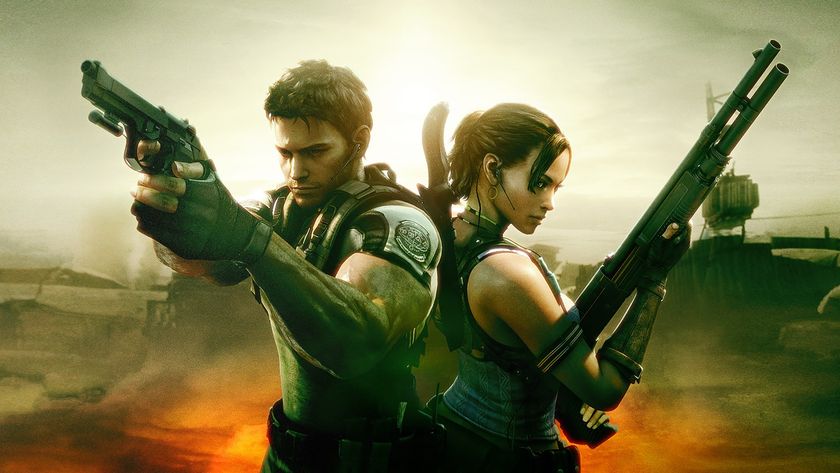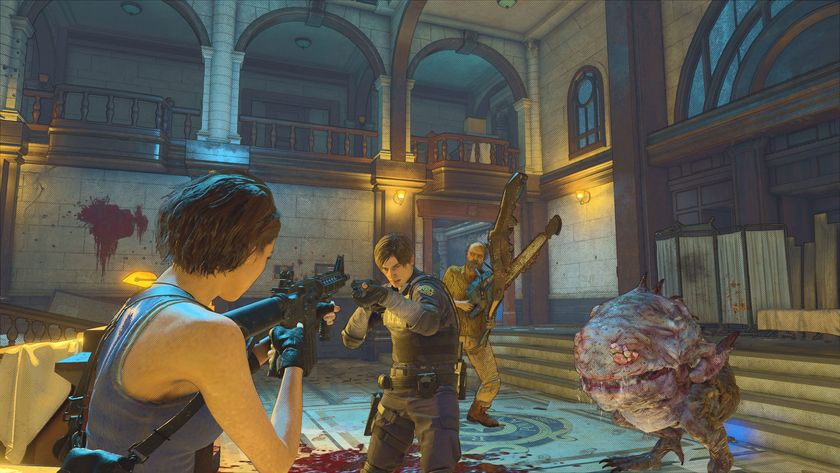Difficulty settings need to be more than just Easy, Normal, and Hard
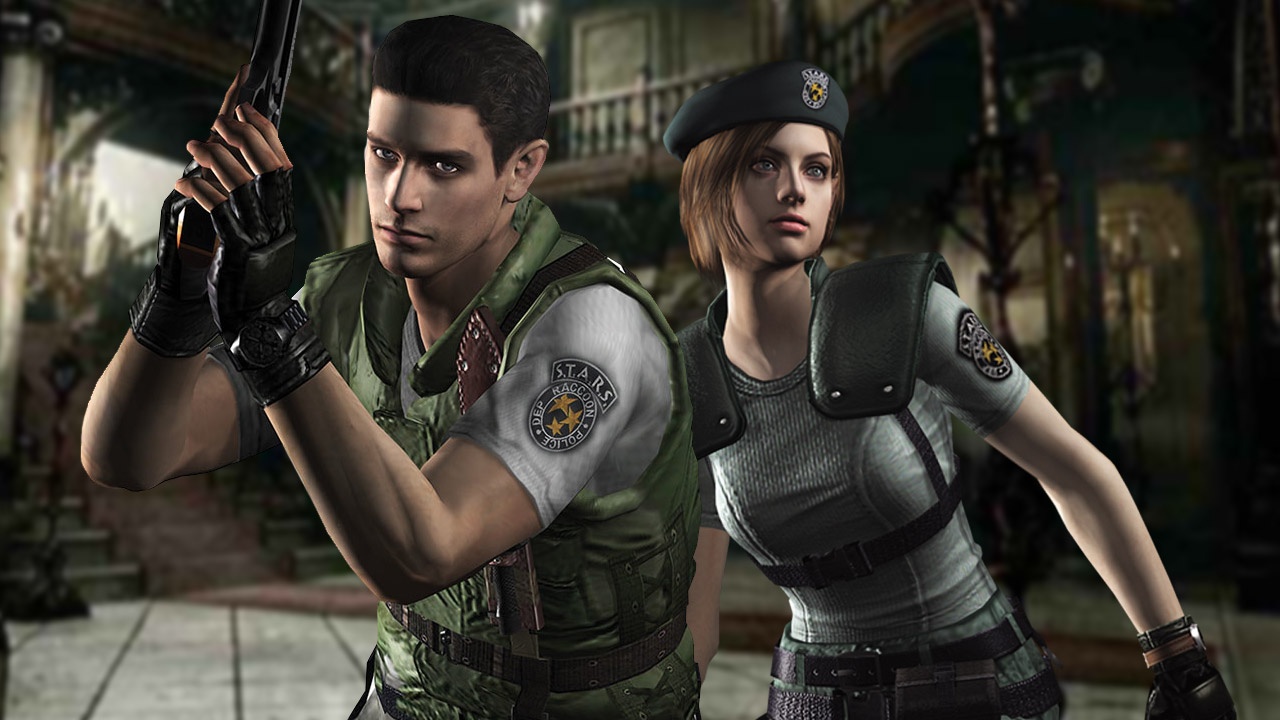
Easy Mode’s not the problem. Easy Mode, ever since it started showing up in home versions of video games like Mega Man 2 back in the 1980s, has never been unwelcome in games. Even when our favorites go out of their way to shame us (no I don’t want to wear a chicken hat, Metal Gear Solid 5) or they accidentally shame us with interruptions (no, I don’t need indestructible golden Mario, Super Mario 3D Land), the notion of a more accessible version of the game is welcome. The problem is the whole conceptual framework of the Easy Mode in the first place. Just making it harder to die while making enemies easier to kill may make finishing an action game like Devil May Cry a breeze, but it also strips out some of the necessary challenge to make the game feel alive. One of Devil May Cry’s stablemates from Capcom has a road map for making easy modes feel more potent not just with the action but the language to describe them.
Resident Evil 7 is not the game to do it. Capcom’s horror game actually goes with the oldest sort of approach. Fire up Resident Evil 7, and you’ve got two choices: Easy and Normal. Play on Easy, and the enemies will go down with markedly less damage and there will be more healing items dotted around the Baker household. Beat the game on Normal difficulty and a third option, Hardcore, opens up that limits your medical supplies, ammunition, and even the number of times you can save the game in addition to making its toothy bad guys more durable. The game is still scary; there’s no stripping away the power of its environment. The reduced threat, when combined with the psychological hurdle of calling it “Easy” mode risks diluting the game. It’s inevitable that, for some, hearing something is easy means it’s also lesser, especially when combined with an alternative called “Normal.” Anything not normal, by definition, is going to be abnormal.
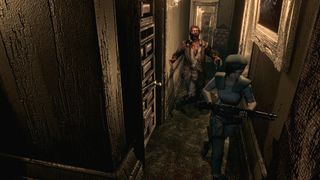
Resident Evil, the remake of the 1996 original that is, came up with a novel solution to the issue. The first time you play the game, you’re given a brief questionnaire mocked up to look like a memo from the game’s STARS police squad. The game asks which you prefer: Mountain Climbing or Hiking? The former says “beyond hardship lies accomplishment” as opposed to a trip where “the destination can be reached rather comfortably” in the latter. The HD re-release from 2014 added a third option in Taking a Walk, where you can just relax, as well as slightly reworded the original two.
The options completely recontextualize difficulty balancing, not counterpointing what’s necessarily a right and wrong way to play, but around the way the player thinks about leisure entirely. Does getting your ass positively kicked sound like the absolute best? Mountain Climbing’s right there. Don’t want to feel exhausted at the end of an hour with the game? Hiking’s there, but it won’t coddle you on the way to the ending. Just a change in the language that surrounds the difficulty balancing does wonders in validating different approaches to the game.
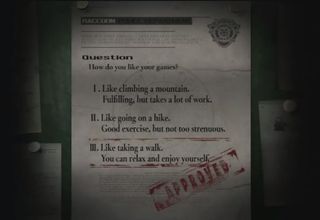
Unfortunately Resident Evil HD’s solution is only a partial step, though. While the language and a variety of rebalanced options makes the game more approachable for a wider variety of players, the steps it takes to balance the game are still basic: supply amounts are shifted and the damage enemies cause is adjusted alongside how much punishment you can take. The ideal version of these modes would expand on one small tweak from the Gamecube. In all modes, some zombies will become Crimson Heads, faster, nastier versions of the undead cannibals that can hunt you through multiple rooms. You also have to set previously beaten zombies on fire, or stab them in the head, using limited items to prevent them from turning into Crimson Heads. If you choose Hiking, they won’t turn for about an hour. If you choose Mountain Climbing, they can start hassling you after as little as 30 minutes.
By varying how quickly Crimson Heads, Resident Evil’s difficulty modes reconsider the entire pace of the game and that, more than adjusting combat, should be the ultimate goal of these different modes. Applying that philosophy to Resident Evil 7 and any game could result in a more playable, welcoming game. Even role-playing games like Final Fantasy could benefit from having different options that reconsidered simply how you move through the game. I’ve argued before that Final Fantasy 12, soon to be re-released on PS4, could have a perfect alternate mode if it let you play through at a low level but with access to advanced skills and equipment, making it challenging by virtue of how quickly you can move through the world but also halving the amount of time it takes to see the game. Imagine a Metal Gear Solid 5 where you could simply play through the missions without having to constantly manage and tinker with all the soldiers and gear you’ve accumulated. Or how about a Dark Souls 3 where you didn’t lose all of your precious souls for leveling up when you died but just half?
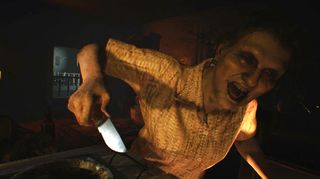
In fact, apply this philosophy straight back into Resident Evil 7. Rather than Easy and Normal, the difficulties could be something along the lines of “Slow - I take my time in dangerous places,” “Fast - I run from fear,” and “Steady - I move with measured confidence.” When I played through Resident Evil 7 on Normal, playing through the Baker house was almost perfect. The atmosphere, exploration, and resource gathering were the essential parts, not the combat. Even though I died a fair number of times, it enhanced the experience. For me it had just the right amount of challenge to make the frightening aspects of the game come vividly alive. The game felt fast but dangerous because it encouraged caution and speed, both mechanically with gathering goods and tonally with the spooky vibes. By the time I got to the game’s final third, though, I had too many resources in a section of the game where action moved to the fore but slowed down considerably. Had the game given me options that balanced the difficulty around maintaining that fast pace throughout, it would have been perfect.
Sign up to the 12DOVE Newsletter
Weekly digests, tales from the communities you love, and more
That’s just one option, though. Capcom could take a number of different approaches to rebalancing Resident Evil 7, but their success or failure wouldn’t be based around simplifying combat but how best those new difficulties suited the game’s themes and enhanced its atmosphere. The Easy Mode problem isn’t how to make games more accessible or if they should be more accessible. The problem is what it means to make them more accessible. Is there a way to make the puzzles harder and the combat easier? Is there a way to speed up enemies? Reassessing what difficulty means, both to players and to each individual game, is the solution.
Most Popular





